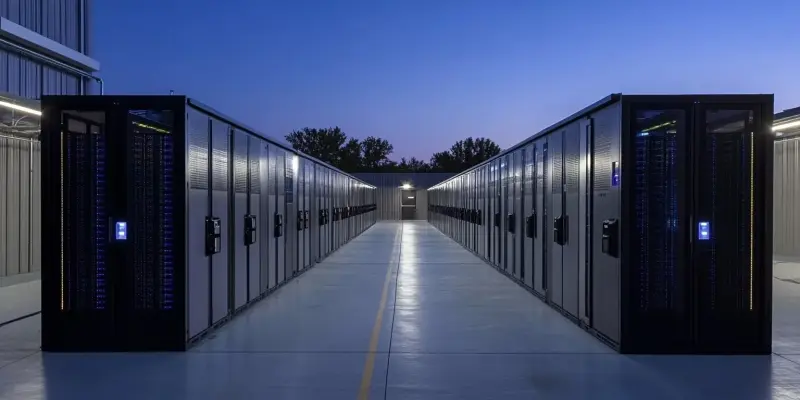The data center industry faces unprecedented challenges due to rising energy demands fueled by artificial intelligence (AI) and compute-intensive workloads, necessitating the evolution of sustainable energy sources, efficient capacity scaling, and advanced cooling technologies. AI models, such as ChatGPT, require immense computing power, leading to an exponential increase in electricity consumption in data centers.
Skyrocketing Energy Consumption
The International Energy Agency (IEA) projects that by 2026, data centers could consume more than 1,000 terawatt-hours (TWh) annually, cementing their status as major energy consumers. To manage these increasing demands, data centers are upgrading their uninterruptible power supplies (UPSs) from kilowatt (kW) ranges to megawatt (MW) capabilities. Additionally, the power per rack is also seeing substantial growth, with AI potentially driving this from a typical 15 kW to an overwhelming 40-100 kW per rack.
Cooling Challenges in High-Energy Systems
Cooling these high-energy systems presents another significant challenge. Traditional air-cooling methods are becoming less effective due to the substantial heat output of GPUs utilized in AI operations. Consequently, water-based cooling methods are gaining traction, despite posing sustainability concerns, particularly in water-scarce regions. Data center operators are compelled to innovate further to maintain these systems’ efficiency and environmental responsibility.
Embracing Renewable Energy Solutions
Addressing energy consumption shortfalls, many tech companies and data center operators are turning to renewable energy solutions. This effort includes installing on-site renewable energy sources like solar panels and forming power purchase agreements (PPAs) with renewable energy providers. Additionally, the exploration of small modular reactors (SMRs) indicates a trend toward securing consistent and reliable long-term energy arrangements. Innovations like AI-optimized chips and smaller language models (SMLs) are being developed to reduce power consumption, with techniques such as query caching, reuse, and carbon emissions-aware algorithms further optimizing energy during AI inference.
Advanced Cooling Technologies
To manage the heightened heat loads of AI-driven data centers, newer cooling technologies are being investigated. Liquid cooling is gaining popularity, and more advanced methods like immersion cooling with dielectric fluids, direct-to-chip cooling, and ceramic components on circuit boards are under development. Experimental solutions like underwater and space-based data centers are also being considered. In existing facilities, efforts to improve airflow efficiency, retrofit cooling towers with electric fans, and use nozzle technology for targeted cooling are being pursued.
Industry’s Shift Towards Sustainability
An overarching trend in the data center industry is a proactive shift towards sustainability and efficiency, driven by the pressures of AI-related energy demands. The consensus among industry stakeholders highlights the necessity for innovative approaches to energy sourcing and cooling to maintain and expand data center capacities sustainably.
Call to Action for the Industry
The data center industry is confronting unparalleled challenges due to soaring energy demands, largely driven by artificial intelligence (AI) and compute-intensive workloads. This surge in energy consumption underscores the critical need for innovation in sustainable energy sources, efficient methods for scaling capacity, and state-of-the-art cooling technologies. AI models, like ChatGPT, require vast amounts of computing power, causing a dramatic rise in electricity usage within data centers. These challenges are compounded by the global pursuit of reducing carbon footprints, which prompts data centers to adopt greener practices without compromising performance.
The industry must balance the growing hunger for AI capabilities with the urgency to manage environmental impacts effectively. Implementing renewable energy sources, optimizing energy efficiency, and exploring alternative cooling techniques are pivotal in meeting these demands. Thus, the evolution of the data center industry revolves around creating a balance between advancing technology and sustainability, ensuring that future growth does not come at the expense of our planet.

